Sudden Rapid Weight Loss in Cats
Although many owners worry about a pet being overweight or obese, unintentional and sudden weight loss in cats is often indicative of serious health problems and should elicit similar concerns. Depending on the cause of the weight loss, the cat’s appetite may greatly diminish or they may stop eating entirely.
A decreased appetite can be very dangerous to the cat as it may develop hepatic lipidosis. This life-threatening condition is sometimes referred to as “fatty liver syndrome” and occurs when a cat’s liver is forced to process large quantities of stored fat to provide enough energy for the body.
Even if a cat is eating its normal diet and its appetite is unaffected, there are clinical causes that lead to sudden and rapid weight loss. If a cat has suddenly lost weight, it is vital that a veterinarian is consulted. A veterinarian will be able to provide information on the cat’s ideal weight and ensure the correct diet is in place to meet its nutritional needs.
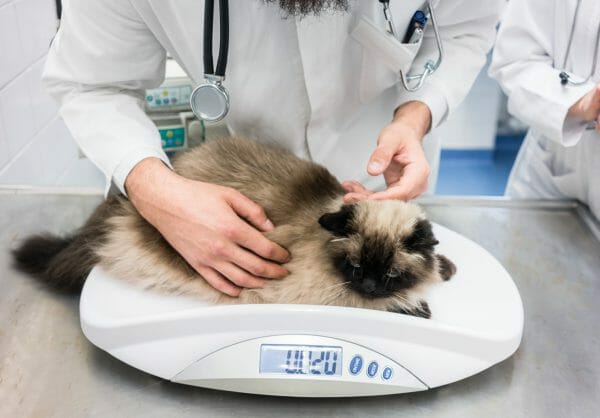
What Causes Sudden Weight Loss in Cats?
There are several causes of sudden weight loss in cats. Each of which varies in severity. The specific reason for the weight loss will be determined by the presence of other clinical signs. In other words, a veterinarian must conduct a thorough physical examination to diagnose the exact cause of a sudden weight loss in a feline. The following conditions all include sudden weight loss as one of their symptoms.
Amyloidosis
Amyloidosis affects the cat’s liver or kidneys. When amyloid proteins are deposited outside the cells of a cat’s organs, it can result in the organ becoming dysfunctional. This condition is rare in most cats and generally only affects these breeds:
- Abyssinians
- Burmese
- Devon Rex
- Oriental Shorthair
- Siamese
- Tonkinese
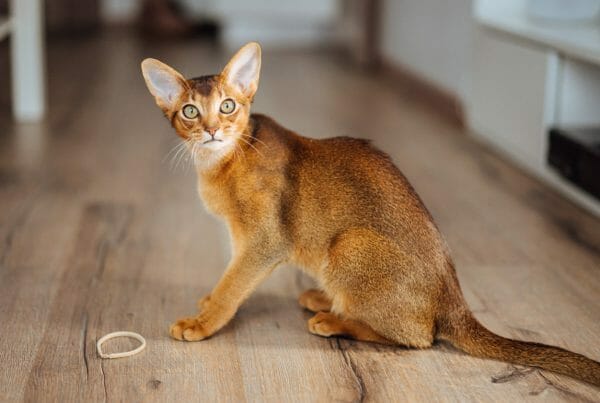
Anemia
If a cat has anemia, the bone marrow fails to produce and circulate enough red blood cells. These blood cells are essential for carrying oxygen throughout the body.
Anemia Symptoms
- Increased heart rate
- Decreased activity levels
- Sluggishness
Anxiety, Depression, and Stress
When psychological issues are present, a cat may lose their appetite, which results in a sudden loss of weight. Stressors that may decrease appetite may include:
- Excessive loud noises
- Dirty food bowls
- Food that is too close to the litter box
- Other animals sharing feeding areas
- The loss of another pet in the household
- Changes in the cat’s feeding routine
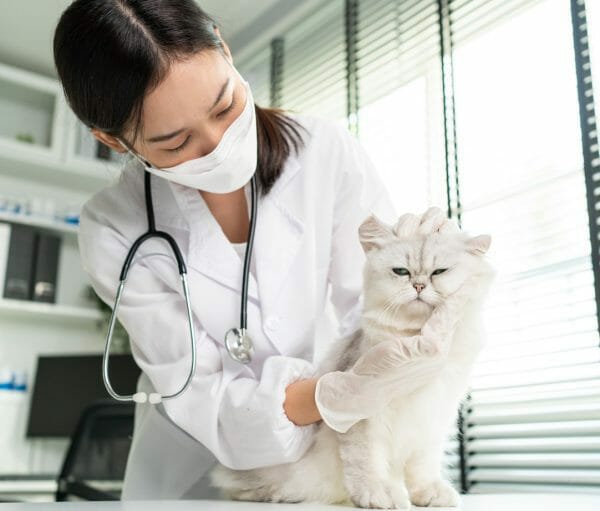
Cancer
Cancer in cats is a common cause of weight loss. In addition to changes in appetite, cat owners should look for:
- Hiding
- Lethargy
- New marks or bumps on the cat’s skin
Diabetes
Caused by an inability to produce or respond to insulin, diabetes can bring about sudden rapid weight loss in cats.
Diabetes Symptoms
- Excessive water consumption
- Increased urination
- Sluggishness
- Urinary tract infections
- Sweet-smelling breath
Feline Infectious Peritonitis
Feline Infectious Peritonitis (FIP) is caused by a feline coronavirus that often infects cats found in multi-cat households or catteries. The virus causes a fever that remains unresponsive to antibiotics. Symptoms of FIP include accumulation of fluid in the abdominal or chest cavities and inflammatory lesions around blood vessels in the eyes, brain, liver, kidneys, or lungs.
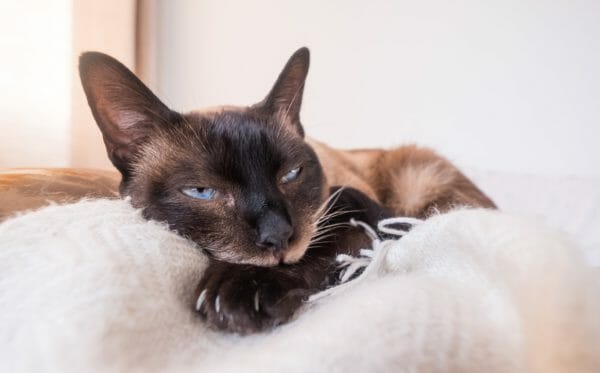
Feline Leukemia
One of the most common causes of death in cats, feline leukemia severely weakens a feline’s immune system. This makes the cat more susceptible to viral infections and can result in the development of lymphoma, a type of cancer that affects the immune system.
Feline Panleukopenia
Also known as distemper and parvo, feline panleukopenia (FP) is a common and potentially fatal condition that severely destabilizes the immune system of the cat. Using vaccines, the parvovirus that causes the condition is now far less common.
Feline Panleukopenia Symptoms
- Diarrhea
- Vomiting
- Lethargy
- Anemia
- Dull coat
Feline Immunodeficiency Virus
Feline immunodeficiency virus (FIV) affects a cat’s immune system and is similar to the human version (which is called HIV). While the virus is inactive, the cat’s lifespan and health are relatively normal. However, once the virus becomes active, it changes to an immunodeficiency disease. The disease leaves the immune system open to attack from various other viruses and infections. Which the cat will be too weak to fight. In some cases, the cat may develop cancer.
FIV Symptoms
- Vomiting
- Diarrhea
- Enlarged lymph nodes
- Fever
- Distention of the gums
- Decreased activity
Heartworm
Transmitted through mosquito bites, heartworm is an uncommon parasite in which worms blocking the cat’s arteries, which prevents blood from flowing to the lungs. Left untreated, heartworms will ultimately lead to death.
Indicators of Feline Heartworm
- Labored breathing
- Heart murmurs
- Lack of energy
- Fainting
- Vomiting
Hyperthyroidism
Hyperthyroidism occurs because of an overproduction of thyroid hormones by the cat’s thyroid gland, which results in an increased metabolic rate that puts a strain on the heart, kidneys, and gastrointestinal system. Given that hyperthyroidism tends to occur in middle age, it is a common cause of sudden weight loss in older cats.
Cat Breeds Prone to Hyperthyroidism
- Abyssinian
- Burmese
- Himalayan
- Persian
- Siamese
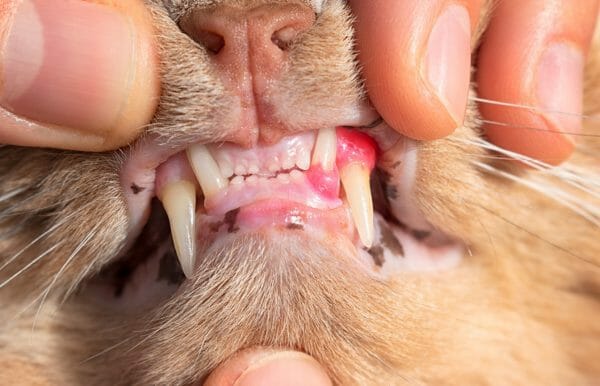
Toothache
If a cat is not eating but exhibits no further outward signs; toothache, gingivitis, or a mouth ulcer may be the cause. Look for evidence of drooling or pawing at the mouth as these may suggest an oral health problem.
Diagnosing Sudden Weight Loss in Cats Causes
To determine the cause of any weight loss, a veterinarian will carry out a full examination of the feline, including blood work, urinalysis, and X-rays. The veterinarian will also ask questions about the cat’s diet and eating habits to ascertain whether there have been any recent changes.
Treating Sudden Weight Loss in Cats
The type of treatment that the veterinarian will prescribe will depend on the diagnosis. Many of the causes of weight loss will require specialist treatments or medicines. If the condition is related to the gastrointestinal tract, an alternative diet may be proposed. In cases where a lack of appetite is a factor in weight loss, feeding tubes or appetite stimulants may be used.
Preventing Sudden Weight Loss in Cats
Although some conditions that cause weight loss may be unavoidable, having the cat weighed during a routine examination with the veterinarian will ensure it is within the ideal weight for the breed and that it is not masking any other symptoms.




